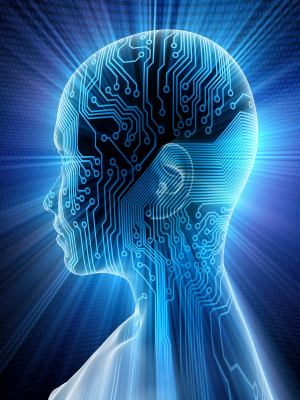Why artificial general intelligence has failed and how to fix it
October 4, 2012

(Credit: stock image)
The field of “artificial general intelligence” or AGI has made no progress whatever during the entire six decades of its existence, says Oxford University physicist David Deutsch in this abridged version of an essay in aeon magazine. — Ed.
It is uncontroversial that the human brain has capabilities that are, in some respects, far superior to those of all other known objects in the cosmos. It is the only kind of object capable of understanding that the cosmos is even there, or why there are infinitely many prime numbers, or that apples fall because of the curvature of space-time, or that obeying its own inborn instincts can be morally wrong, or that it itself exists. Nor are its unique abilities confined to such cerebral matters.
The cold, physical fact is that it is the only kind of object that can propel itself into space and back without harm, or predict and prevent a meteor strike on itself, or cool objects to a billionth of a degree above absolute zero, or detect others of its kind across galactic distances.
But no brain on Earth is yet close to knowing what brains do in order to achieve any of that functionality. The enterprise of achieving it artificially — the field of ‘artificial general intelligence’ or AGI — has made no progress whatever during the entire six decades of its existence.
What is needed is nothing less than a breakthrough in philosophy, a theory that explains how brains create explanations … and hence defines, in principle, without ever running them as programs, which algorithms possess that functionality and which do not.
Why? Because, as an unknown sage once remarked, ‘it ain’t what we don’t know that causes trouble, it’s what we know for sure that just ain’t so’ (and if you know that sage was Mark Twain, then what you know ain’t so either). I cannot think of any other significant field of knowledge in which the prevailing wisdom, not only in society at large but also among experts, is so beset with entrenched, overlapping, fundamental errors. Yet it has also been one of the most self-confident fields in prophesying that it will soon achieve the ultimate breakthrough.
Despite this long record of failure, AGI must be possible. And that is because of a deep property of the laws of physics, namely theuniversality of computation. This entails that everything that the laws of physics require a physical object to do can, in principle, be emulated in arbitrarily fine detail by some program on a general-purpose computer, provided it is given enough time and memory. The first people to guess this and to grapple with its ramifications were the 19th-century mathematician Charles Babbage and his assistant Ada, Countess of Lovelace. It remained a guess until the 1980s, when I proved it using the quantum theory of computation. …
The lack of progress in AGI is due to a severe logjam of misconceptions. Without Popperian epistemology, one cannot even begin to guess what detailed functionality must be achieved to make an AGI. And Popperian epistemology is not widely known, let alone understood well enough to be applied. Thinking of an AGI as a machine for translating experiences, rewards and punishments into ideas (or worse, just into behaviours) is like trying to cure infectious diseases by balancing bodily humours: futile because it is rooted in an archaic and wildly mistaken world view.
Without understanding that the functionality of an AGI is qualitatively different from that of any other kind of computer program, one is working in an entirely different field. If one works towards programs whose ‘thinking’ is constitutionally incapable of violating predetermined constraints, one is trying to engineer away the defining attribute of an intelligent being, of a person: namely creativity.
Clearing this logjam will not, by itself, provide the answer. Yet the answer, conceived in those terms, cannot be all that difficult. For yet another consequence of understanding that the target ability is qualitatively different is that, since humans have it and apes do not, the information for how to achieve it must be encoded in the relatively tiny number of differences between the DNA of humans and that of chimpanzees. So in one respect I can agree with the AGI-is-imminent camp: it is plausible that just a single idea stands between us and the breakthrough. But it will have to be one of the best ideas ever. …